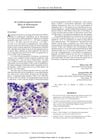 1 citations,
October 2018 in “Infectious diseases in clinical practice”
1 citations,
October 2018 in “Infectious diseases in clinical practice” Azithromycin can rarely cause a severe drop in white blood cells.
 1 citations,
May 2017 in “Journal of the American Academy of Dermatology”
1 citations,
May 2017 in “Journal of the American Academy of Dermatology” Tofacitinib helped a teenager with severe hair loss grow hair back, but more research is needed.
 1 citations,
January 2017 in “Expert opinion on orphan drugs”
1 citations,
January 2017 in “Expert opinion on orphan drugs” Adalimumab is the most effective treatment for severe hidradenitis suppurativa, but more research is needed to improve treatment options.
 1 citations,
July 2016 in “Cosmetics”
1 citations,
July 2016 in “Cosmetics” Black henna tattoos can cause severe allergies to hair and textile dyes, and there's a need for greater public awareness and regulation.
 1 citations,
March 2012 in “Revue neurologique”
1 citations,
March 2012 in “Revue neurologique” Proper diet management is crucial for preventing severe symptoms in phenylketonuria.
 1 citations,
March 2011 in “Informa Healthcare eBooks”
1 citations,
March 2011 in “Informa Healthcare eBooks” Isotretinoin is a preferred treatment for severe acne, often leading to long-term improvement, but requires careful monitoring due to potential side effects.
1 citations,
February 2005 in “The Journal of Laryngology & Otology” A fungal infection in the neck caused severe breathing issues, treated successfully with antibiotics and antifungal medication.
 October 2024 in “Canadian Journal of Health Technologies”
October 2024 in “Canadian Journal of Health Technologies” Olumiant should be covered for severe alopecia areata if certain conditions are met.
 September 2024 in “Electronic Journal of General Medicine”
September 2024 in “Electronic Journal of General Medicine” Laser hair removal can cause severe skin irritation, but it can improve with treatment.
 September 2024 in “Journal of the American Academy of Dermatology”
September 2024 in “Journal of the American Academy of Dermatology” Baricitinib maintains significant hair regrowth in severe alopecia areata over three years.
 June 2024 in “Journal of Cosmetic Dermatology”
June 2024 in “Journal of Cosmetic Dermatology” Hair transplants are better for severe hair loss, while scalp micropigmentation suits those with denser hair.
 March 2024 in “Dermatology and therapy”
March 2024 in “Dermatology and therapy” AA patients with comorbid conditions face more severe hair loss and need specific treatments.
 March 2024 in “Ukraïnsʹkij vìsnik psihonevrologìï”
March 2024 in “Ukraïnsʹkij vìsnik psihonevrologìï” Women with mixed alopecia have more severe mental health issues than those with metabolic alopecia.
 March 2024 in “Frontiers in endocrinology”
March 2024 in “Frontiers in endocrinology” A new MTX2 gene mutation caused a severe genetic disorder in a young Chinese girl.
March 2024 in “International journal of molecular sciences” Three specific genetic variants cause severe skin issues in children with EBS, highlighting the need for early genetic screening.
 February 2024 in “Journal of cutaneous and aesthetic surgery”
February 2024 in “Journal of cutaneous and aesthetic surgery” The combined treatment helps improve severe hair loss and reduces the need for other medications.
 January 2024 in “Indian Journal of Plastic Surgery/Indian journal of plastic surgery”
January 2024 in “Indian Journal of Plastic Surgery/Indian journal of plastic surgery” The flap advancement technique effectively treats severe scalp skin conditions, preserving hair and improving appearance.
 December 2023 in “Curēus”
December 2023 in “Curēus” A woman with lupus had rare severe symptoms but improved with treatment.
 December 2023 in “European journal of dermatology/EJD. European journal of dermatology”
December 2023 in “European journal of dermatology/EJD. European journal of dermatology” More effective treatments are needed for severe alopecia areata.
 November 2023 in “Dermatologica sinica/Zhōnghuá pífūkē yīxué zázhì”
November 2023 in “Dermatologica sinica/Zhōnghuá pífūkē yīxué zázhì” Upadacitinib helped regrow hair in a severe alopecia areata patient but stopping treatment caused hair loss to return.
November 2023 in “Children” Many pediatric epilepsy patients experience preventable severe adverse drug reactions, especially with certain medications and risk factors.
 October 2023 in “CHEST Journal”
October 2023 in “CHEST Journal” Early recognition and treatment of severe SLE symptoms can improve outcomes.
 September 2023 in “Clinical, Cosmetic and Investigational Dermatology”
September 2023 in “Clinical, Cosmetic and Investigational Dermatology” Higher SHBG levels are linked to less severe hair loss in women, but vitamin D levels don't seem to affect hair loss.
 September 2023 in “Journal of the American Academy of Dermatology”
September 2023 in “Journal of the American Academy of Dermatology” Topical tofacitinib helped a man with severe scalp condition after other treatments failed.
 June 2023 in “International Journal of Research in Dermatology”
June 2023 in “International Journal of Research in Dermatology” Certain gene variations are linked to severe acne in Egyptian patients and could guide treatment choices.
 May 2023 in “Current Applied Science and Technology”
May 2023 in “Current Applied Science and Technology” Higher power CO2 laser causes more severe skin burns and damage.
 May 2023 in “Bali Medical Journal”
May 2023 in “Bali Medical Journal” Higher sebum levels are linked to more severe male baldness.
 April 2023 in “International Journal of Research in Dermatology”
April 2023 in “International Journal of Research in Dermatology” Baricitinib is a promising treatment for severe alopecia areata with minimal side effects.
 April 2023 in “Journal of Investigative Dermatology”
April 2023 in “Journal of Investigative Dermatology” Some patients who had a severe drug reaction developed long-term hair loss.
 April 2023 in “Revista colombiana de reumatología”
April 2023 in “Revista colombiana de reumatología” JAK inhibitors like tofacitinib can effectively treat severe alopecia areata.



























